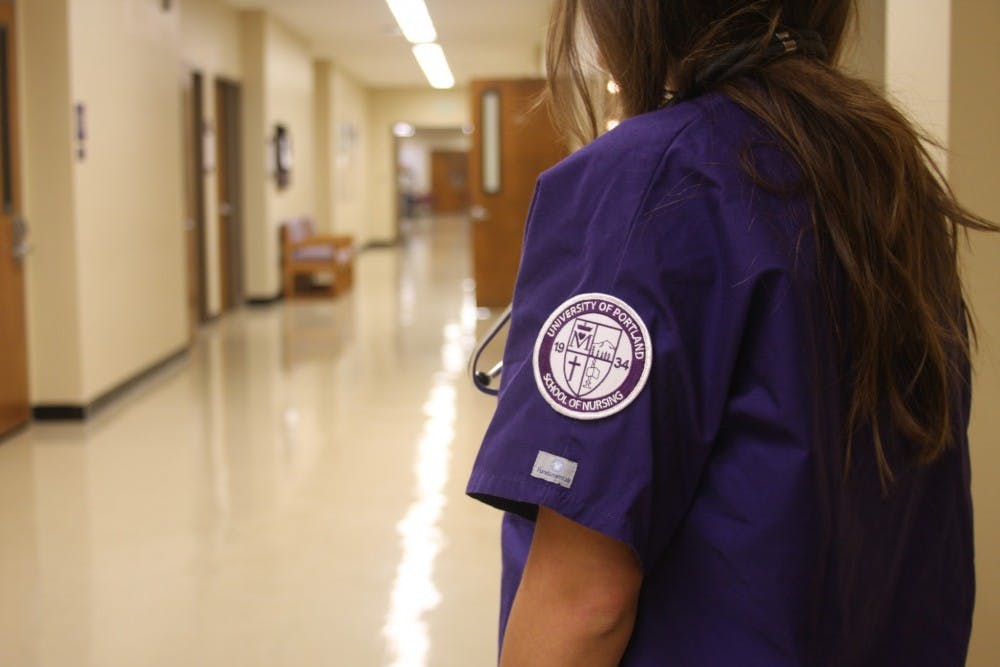Nastacia Voisin |
Something was not right.
Professor Lorretta Krautscheid’s senior nursing students kept telling her the same thing: The textbook ethical theories they learned in class weren’t being practiced by nurses or doctors at their clinical placements.
“Students would come to me saying, ‘I’m concerned. I don’t know what I should do,’” Krautscheid said.
She knew her students were being forced to make a tough ethical decision – should they break away from proper procedure, or dare to contradict experienced medical workers?
That confusion between classroom and hospital expectation was exactly what Krautscheid wanted to solve.
“I decided something had to be done about this,” she said.
In 2010 and 2011, with the aid of the Dundon-Berchtold Initiative in Applied Ethics Initiative, she conducted two sister studies on how young nurses responded when pressured to make unethical choices. The first study (now published in the Journal of Nursing Education) focused on senior nursing students, and the second targeted recently graduated nurses.
Krautscheid’s findings confirmed her theory: When medical experts took shortcuts, in-training and young nurses followed suit, often without question. Even the registered nurses caved to authority 30-50 percent of the time.
“They told us classroom work wasn’t relatable to the real world,” Krautscheid said, “even when that meant diverging from standard practices.”
UP alum Angie Winczewski, who graduated from the School of Nursing in May, recalled wrestling with that disparity at her clinical placements.
“There were times that I thought, ‘This isn’t what I learned,’” she said. “But as a student, it’s hard to know what’s right or wrong.”
Most of the time, she said, she followed academic guidelines. But sometimes the nurses persuaded her to break procedure.
“I was learning, so it was hard to say, ‘You’re doing that wrong,’” Winczewski said.
Since the ethical guidelines nurses learn are intended to protect patients, skipping steps – such as reducing sterilization time – can have significant ethical implications, she said.
But if all the research articles, lectures and lab practice on ethics don’t empower UP nursing majors to make on-the-spot moral decisions, what will?
“Practice,” Krautscheid said. “There’s a disconnect between knowing you should do something, and actually doing it. And that discontent is social pressure.”
Her studies found that young nurses fear looking silly or creating conflict with hospital staff.
“It’s hard to confront someone who’s so much more experienced,” Krautscheid said.
Yet she’s confident that UP students have the knowledge and the capacity to take moral action despite the risk of adverse consequences. What they’re lacking is the experience of communicating in ethically stressful moments and letting their moral courage shine through.
To better prepare UP’s nursing students, Krautscheid wants them to practice ethical role-rehearsal. But unlike traditional classroom role-play, she wants the scenarios to take place in a simulation lab.
Simulation labs – like the one located in Buckley Center – look, smell, feel and behave like a hospital. Currently, nursing students rehearse realistic medical situations in the lab starting junior year.
Krautscheid envisions adding ethical crisis scenarios to the curriculum by hiring doctors and nurses as “actors” to challenge students mid-simulation with a procedure shortcut. She hopes being on home ground will remind students to make sound moral choices, while the realism of the situation will give them confidence to do the same during clinicals.
“They became nurses because they want to help people,” Krautscheid said. “We just want to give them the tools to do that.”
Nastacia Voisin is the copy editor of The Beacon. You can reach her at voisin15@up.edu and on Twitter @nastaciavoisin.








